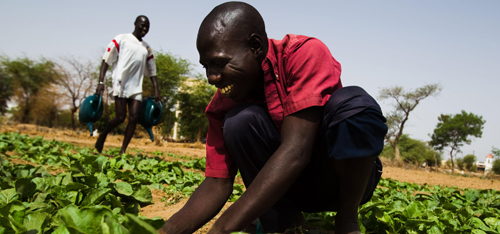Burkina Faso
Burkina Faso, like other countries in the Sahel region, is prone to drought and floods. These climate-related events threaten livelihoods and food security, especially as the country's smallholder farmers rely mostly on the rains to produce staple grains and cash crops such as cotton, and raise livestock.
Despite good cereal harvests in 2012 and 2013, the lingering effects of the 2011/12 Sahel drought have left many Burkinabe households vulnerable to food insecurity, especially those who lost most of their productive assets. Around 45 percent of the population lives on less than USD 1.25 a day. So even when food availability is good, many poor farming and pastoralist families struggle to buy the food they need. In the northern Sahel region, the influx of Malian refugees, many arriving with their own livestock, has strained already fragile natural resources, increasing the risk of hunger and malnutrition in the area.
IPPM programme in Burkina Faso
The programme in Burkina Faso is in line with Government policies and strategies to improve food security, boost rural incomes and sustainably manage natural resources.
Since 2002, IPPM in Burkina Faso has worked with farmers to increase their adoption of good agronomic practices and sustainably enhance crop yields and diversify their farming systems. One way of doing this has been by reducing farmers' use of pesticides - and raising awareness of the associated environmental and health risks - while also promoting balanced fertilization for healthy crop growth. The programme has also helped farmers adapt to a changing climate, important in a country where cycles of drought and floods are becoming the new norm.
Thanks to IPPM training, farmers have learned new cropping methods to boost yields, as well as skills to improve the marketing of their products. They have been encouraged to diversify crop and livestock production, which will benefit not only the environment, but also household nutrition and incomes. As a result of training, many farmers have also begun to explore such things as integrated rice-fish farming.
The programme has trained a total of 27 000 farmers, 14 percent of them women, through its network of farmer field schools in the country's 13 regions. Training has focused mainly on rice, vegetable, cowpea, fruit and cotton production. The Government has now adopted the farmer field school model as one of its national outreach tools.
IPPM projects in Burkina Faso
- All ACP Agricultural Commodities Programme, including cotton (regional)
- Integrated Production and Protection Management in West Africa (regional)
- Supporting competitiveness and sustainable intensification of African cotton sectors through capacity development on IPPM (regional)
Partners
FAO works with various partners to carry out IPPM activities in Burkina Faso, including: Direction de la Protection des Végétaux; Direction de la Vulgarisation et de la Recherche-Développement; Direction Générale des Productions Végétales; Ministère de l’Agriculture et de la Sécurité Alimentaire; non-governmental organizations; producer organizations; Union Nationale des Producteurs de Coton du Burkina Faso; and other partners.
FAO is grateful for the continued support from its resource partners, including: European Union; Global Environment Facility; and Government of the Netherlands.

